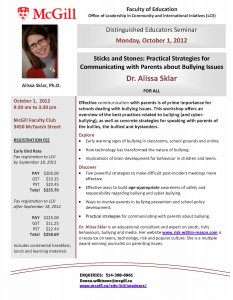 Teachers and school administrators consistently tell me that one of the most challenging aspects of dealing with bullying issues is communicating with parents. Parents of the bullies, for sure, but also parents of the kids who are targeted, and the kids who witness bullying events in the schoolyard, the playground or online.
Teachers and school administrators consistently tell me that one of the most challenging aspects of dealing with bullying issues is communicating with parents. Parents of the bullies, for sure, but also parents of the kids who are targeted, and the kids who witness bullying events in the schoolyard, the playground or online.
Parents want what’s best for their children, of course. But sometimes this concern — and the emotions bound up with it — can interfere with proactive attempts to educate students about bullying, to give them the tools to protect themselves and stand up for others, and stop doing or saying things that are upsetting or harmful to others. Parents of kids who are aggressive to others are sometimes unable to admit to themselves that their child is being hurtful, and they tend to be very defensive and resistant when principals or teachers call them in to discuss this.
Students quickly pick up on the tension between their parents and the school, and this tends to muddy or render ineffective any anti-bullying messages that might otherwise sensitize kids to this important issue.
This one-day workshop is oriented towards developing practical strategies for school personnel involved in this kind of communication with parents. We will look at proactive, preventative communication (before anything occurs, to establish school policies and protocols, and to involve them as stakeholders), at developing sample scripts for phone calls and written communication, at negotiation strategies to get past defensiveness, anger and confusion and move everyone to consensus or acceptance. Clearly defined policies can go a long way to lessening stress and aggravation for all concerned.
Email donna.wilkinson@mcgill.ca or call her at 514-398-6961 for more information and registration forms.



